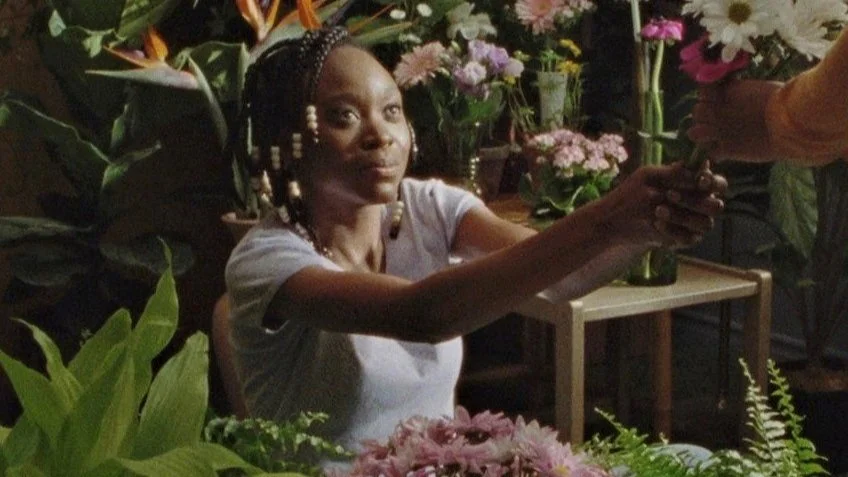Cette Maison
Haitian director Miryam Charles delivers a highly original, stylised fantasy about loss.
Cette Maison is a poetic film about loss. It is the first feature by the Haitian director Miryam Charles who is based in Quebec and it could not be a more personal work. Writer as well as director, Charles is here drawing on a real-life event, the tragic death of her cousin Tessa in Bridgeport, Connecticut in 2008 at the age of fourteen. However, by making the film’s central figures Tessa herself and her mother Valeska, Charles is also bringing into play issues about people cut off from their roots yet not able to forget them even as they seek to make a home in a country not their own. To a great extent this means that Charles is actually giving us a work reflecting also on her own life.
This film is certainly unusual and some of the descriptions of it that I have read strike me as being unintentionally misleading. Because Cette Maison reflects on a death that really happened it has in some quarters been designated a documentary. However, this is not only a work utilising actors but one that is a freewheeling stylised piece which goes well beyond the sphere of magical realism that some have seen in it. Similarly, to label Cette Maison as experimental suggests that it is the kind of avant-garde work that appeals only to those who embrace films that are truly way out. I can understand those who place it in that category for it lacks any standard structure. Nevertheless, those with a taste for adventurous cinema and with a sense of poetry might well find it more rewarding than most films which get labelled as experimental.
The film opens with a bold and rewarding move. Having started out with voice over, it quickly goes on to present us with Tessa as played by Schelby Jean-Baptiste. She tells us that she was born in Stamford, Connecticut in 1994 and died fourteen years later so we know at once that rather than dealing with reality in a literal way Cette Maison is inviting us to see Tessa as a kind of spirit. She is no longer a child but a presence who accompanies her mother (Florence Blain Mbaye) for she is daily alive in Valeska’s mind even as she goes about reliving memories of her daughter’s death. By setting up this situation in such clear terms, Charles gives herself the freedom to explore all her concerns without any questions arising as to which scenes are real and which are imagined and it also enables her to incorporate an imagined return to Haiti by Valeska to show her homeland, now changed beyond recognition, to her daughter.
In contrast to that, the film can even use the equivalent of a stage set with ease, as in scenes regarding Tessa's death and a doctor’s revelation of how she'd been strangled following earlier bruising and, indeed, sexual assault. But Cette Maison is not an investigation into her death even if it is concerned with the life that she never lived due to it being cut off. The essence here is found first in the fact that Tessa was deprived of the life that she should have had (her loss) and secondly in the consequence of that, namely that following her death her mother would think about her every day (Valeska’s loss). Beyond that you have a film that reflects on what Haiti means to these people – to Tessa as a Haitian who never knew what could be considered her real home country and to Valeska who comes to realise that all her memories of Haiti relate to a place that no longer exists as she remembers it. This represents the wider loss that comes to us all when we recognise that time past is irrecoverable.
Cette Maison invites the viewer to ponder these matters and it does so in a very individual way, one in which it is poetic feeling that unites its images and its words. Late on we have a section set in Quebec which comes directly from Charles's own memories of being there in 1995. That was when she and her relatives feared that a referendum might lead to Québec becoming independent from Canada and in consequence no longer a welcome abode for Haitians. This section fits rather uncomfortably with the tone of the rest of the film and it's also the case that the film leaves it up to viewers to form their own conclusions as to what attitude Cette Maison is adopting over religious beliefs. Overall, therefore, one does not feel that this is close to being a masterpiece although those with knowledge of Haitian culture and beliefs might more readily find a clearer statement in it. Nevertheless, while not for everybody, this is a film with a character all its own and one all the more welcome at a time when few films appear that are so poetical in concept and character.
Also known as: This House.
MANSEL STIMPSON
Cast: Schelby Jean-Baptiste, Florence Blain Mbaye, Eve Duranceau, Nadine Jean, Yardly Kavanagh, Tracy Marcelin, Mireille Metellus, Matthew Rankin.
Dir Miryam Charles, Pro Félix Dufour-Laperrière, Screenplay Miryam Charles, Ph Isabelle Stachtchenko and Miryam Charles, Ed Xi Feng, Music Romain Camiolo.
L’Embuscade Films-T A P E Collective.
74 mins. Canada. 2022. UK Rel: 4 November 2022. Cert. 12A.


